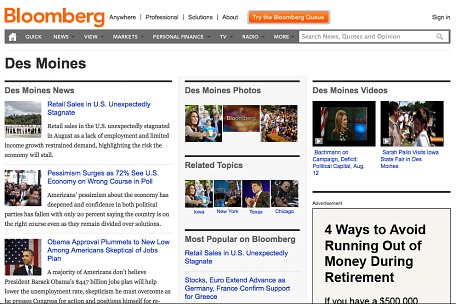Correlation is not causation.
That’s a hard lesson to internalize for the press, which insists on slapping a narrative on almost every scrap of news. And stuff that happens at the same time that other stuff happens is the easiest storyline, even though it doesn’t prove anything.
That’s true for markets reporting, which usually reports that the Dow moved up or down for one reason, despite the fact that trillions of variables are involved.
It’s also true for political reporting, as stories out today from Bloomberg and Reuters show. They have opposing reports on which way Obama’s approval ratings are going and both point the finger at his speech to Congress last week for the movement.
Here’s Bloomberg’s headline:
Obama Approval Plummets on Jobs Plan
And Reuters:
Obama gets slight boost from jobs speech: poll
They can’t both be right. Sure, they’re reporting the differing results of separate polls. But that just shows polling is an inexact science often more conducive to nuance than declaration, as well as how reporting on polling often makes things murkier.
Reuters’s poll shows Obama moving from a 45 percent appoval rating to 47 percent in the days after his jobs speech. That movement is well within the poll’s margin of error, which is 3 percentage points, so the poll isn’t necessarily showing anything at all.
The story pins the credit for the slight possible improvement in Obama’s approval rating to his speech to Congress last week pitching another round of stimulus. But there’s no evidence in the piece that it had anything to do with the speech. Did the poll ask voters whether it influenced their opinion? We’re not told.
Bloomberg, on the other hand, is even worse. It says Obama’s approval “plummets on jobs plan,” but it never tells us how far it fell. We do get his disapproval numbers have risen nine points—but that’s from six months ago, which is irrelevant when determining reaction to a jobs speech six days ago. “Plummets” is a strong word. You can’t tell us something “plummets” and then not tell us how far it actually fell. Bloomberg, at least, does report that its respondents disapproved of his jobs plan by a 51-40 margin.
Also annoying: Reuters doesn’t link to the full results of their poll. Bloomberg links to today’s poll (though you really have to search to find it) but it doesn’t contain previous numbers. The only link in Reuters’s entire story is one of those no-good keyword links to its coverage of the economy.
Bloomberg is no better. Of the fifteen links in its piece, fourteen are to topic pages, and one is to CNN’s 2008 exit poll page. But if only 7 percent of your links are real links, you might as well not even bother. Your readers are going to quit clicking them if they end up on too many computer-generated topic pages. Unless you’re from Iowa, you’re probably not going to care for ending up on Bloomberg News’s Des Moines topic page, which is one of the places this story sends you:
The thing about horse-race journalism is that it’s not hard. You can crank this stuff out. Which makes it worse when it falls short like these stories do.
Ryan Chittum is a former Wall Street Journal reporter, and deputy editor of The Audit, CJR’s business section. If you see notable business journalism, give him a heads-up at rc2538@columbia.edu. Follow him on Twitter at @ryanchittum.

